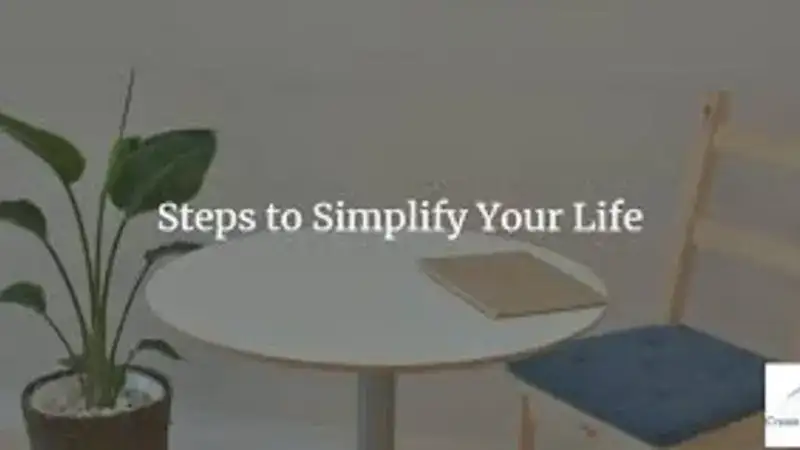A Step-by-Step Guide to Simplifying Your Life
Clutter – it’s a word that can evoke feelings of anxiety, overwhelm, and frustration. But what if you could break free from the clutter that’s holding you back? What if you could create a simplified life that allows you to breathe easier, think clearer, and live more intentionally?
In this article, we’ll explore the benefits of decluttering and how it can transform your life. We’ll also provide practical tips and strategies for getting started, tackling clutter hotspots, and maintaining a clutter-free space.
The Emotional and Mental Benefits of Decluttering
Decluttering is not just about getting rid of physical stuff; it’s also about clearing mental and emotional clutter. When we surround ourselves with clutter, it can contribute to feelings of:
- Anxiety and stress.
- Overwhelm and fatigue.
- Depression and low mood.
- Lack of focus and concentration.
By decluttering our physical space, we can also clear our minds and emotions. We can create a sense of calm, clarity, and focus that allows us to live more intentionally and authentically.
How Clutter Affects Productivity and Focus
Clutter can also have a significant impact on our productivity and focus. When we’re surrounded by clutter, it can be difficult to:
- Concentrate and focus on tasks.
- Find the information and resources we need.
- Make decisions and take action.
- Feel motivated and inspired.
By decluttering our workspace and living areas, we can create an environment that supports productivity, focus, and creativity. We can work more efficiently, achieve our goals, and feel a sense of accomplishment and satisfaction.
The Financial Benefits of Reducing Consumption and Waste
Decluttering can also have a positive impact on our finances. By reducing our consumption and waste, we can:
- Save money on purchases and subscriptions.
- Reduce our energy consumption and utility bills.
- Avoid costly repairs and replacements.
- Create a more sustainable and environmentally-friendly lifestyle.
Strategies for Overcoming the Overwhelm of Clutter
So, how do you get started on your decluttering journey? Here are some strategies for overcoming the overwhelm of clutter:
- Start small: Begin with one area or task at a time. This will help you build momentum and confidence.
- Create a plan: Make a list of the areas and tasks you want to tackle. Break down larger tasks into smaller, manageable chunks.
- Set realistic goals: Be realistic about what you can achieve in a day or a week. Don’t set yourself up for failure by trying to do too much.
- Seek support: Share your goals and progress with a friend or family member. Ask for their support and encouragement.
Identifying and Tackling Clutter Hotspots
Clutter hotspots are areas where clutter tends to accumulate. Here are some common clutter hotspots and tips for tackling them:
- Entryways: Use a tray or basket to collect keys, mail, and other items that tend to clutter up entryways.
- Kitchen counters: Clear off kitchen counters by storing appliances, gadgets, and other items in cupboards or drawers.
- Closets: Use a closet organizer system to maximize storage space and keep clothing and accessories organized.
- Desks and workspaces: Use a desk organizer or tray to collect papers, pens, and other office supplies.
Building Momentum and Staying Motivated
Decluttering can be a challenging and time-consuming process. Here are some tips for building momentum and staying motivated:
- Celebrate your successes: Take time to celebrate your successes, no matter how small they may seem.
- Reward yourself: Treat yourself to something special when you reach a milestone or complete a challenging task.
- Find accountability: Share your progress with a friend or family member and ask them to hold you accountable.
- Take breaks: Take breaks and practice self-care to avoid burnout and maintain your motivation.
The Decluttering Process: A Room-by-Room Guide
Decluttering is a process that requires patience, persistence, and a clear plan. Here’s a room-by-room guide to help you get started:
- Living areas: Start by clearing off surfaces and sorting items into categories (e.g., books, magazines, remotes).
- Kitchens: Clear off countertops and sort items into categories (e.g., baking supplies, cooking utensils, dishes).
- Bedrooms: Start by making your bed and sorting items into categories (e.g., clothing, accessories, books).
- Bathrooms: Clear off countertops and sort items into categories (e.g., toiletries, towels, cleaning supplies).
Maintaining the Momentum: Tips for Staying Clutter-Free
Congratulations on taking the first steps towards a clutter-free life! Now that you’ve decluttered and organized your space, it’s essential to maintain the momentum and prevent clutter from creeping back in. Here are some tips to help you stay on track:
Creating Habits for Regular Decluttering and Maintenance
- Schedule regular decluttering sessions: Set aside time each week or month to maintain your space and tackle any clutter that may have accumulated.
- Create a maintenance routine: Develop a daily or weekly routine that includes tasks such as tidying up, wiping down surfaces, and putting away items that are out of place.
- Make decluttering a habit: Incorporate decluttering into your daily routine, such as decluttering for 10 minutes each day or dedicating an hour on the weekend to maintenance.
Strategies for Avoiding Clutter Creep and Staying Organized
- Implement the “one in, one out” rule: For every new item that comes into your home or workspace, get rid of an old one to maintain a balanced amount of possessions.
- Use storage containers and labels: Use storage containers and labels to keep items organized and out of sight, reducing the likelihood of clutter accumulating.
- Avoid impulse purchases: Think twice before making impulse purchases, and ask yourself if you really need the item and if it aligns with your values and goals.
Building a Support System for Maintaining a Clutter-Free Lifestyle
- Share your goals with a friend or family member: Share your goals and progress with a friend or family member and ask for their support and encouragement.
- Join a decluttering community: Join online communities or local groups of people who share your goal of maintaining a clutter-free lifestyle.
- Hire a professional organizer: If you need additional support, consider hiring a professional organizer to help you maintain your space and stay organized.
The Power of Mindful Consumption: Breaking the Cycle of Clutter
Clutter is often a symptom of a larger issue – our consumption habits. By understanding the root causes of clutter and consumption, we can break the cycle of clutter and create a more intentional and simplified approach to living.
Understanding the Root Causes of Clutter and Consumption
- Identify your triggers: Reflect on why you buy and consume. Is it due to stress, boredom, or habit?
- Recognize the impact of advertising: Be aware of how advertising influences your purchasing decisions and try to resist the temptation of impulse buys.
- Understand the value of experiences over material possessions: Focus on creating meaningful experiences and connections rather than accumulating material possessions.
Strategies for Mindful Consumption and Reducing Waste
- Practice mindful shopping: Take time to reflect on your purchases and ask yourself if you really need the item.
- Use the 30-day rule: Wait 30 days before making a non-essential purchase to ensure that the item is something you truly need.
- Choose quality over quantity: Invest in high-quality, sustainable products that will last longer and reduce waste.
Building a More Intentional and Simplified Approach to Living
- Define your values and goals: Reflect on what’s truly important to you and align your consumption habits with your values and goals.
- Create a vision for your ideal lifestyle: Imagine your ideal lifestyle and create a plan to achieve it.
- Take small steps towards simplicity: Start with small changes, such as reducing your wardrobe or canceling subscription services, and work your way towards a more simplified lifestyle.
Conclusion
Maintaining a clutter-free lifestyle is a journey that requires patience, kindness, and compassion towards yourself. As you reflect on your journey, celebrate your successes, no matter how small they may seem, and learn from your mistakes, using them as opportunities to grow. Prioritize self-care, taking care of your physical, emotional, and mental well-being, and seek support when needed. As you move forward, stay committed to your goals and values, remain patient and persistent, and embrace the freedom and simplicity that comes with a clutter-free lifestyle, nurturing and cultivating it to create a lasting sense of clarity and freedom.







